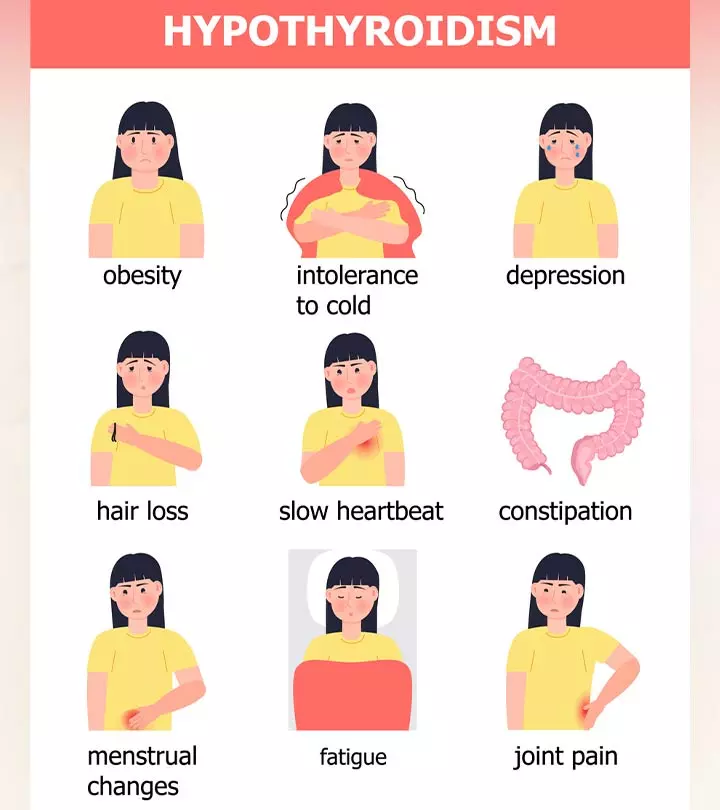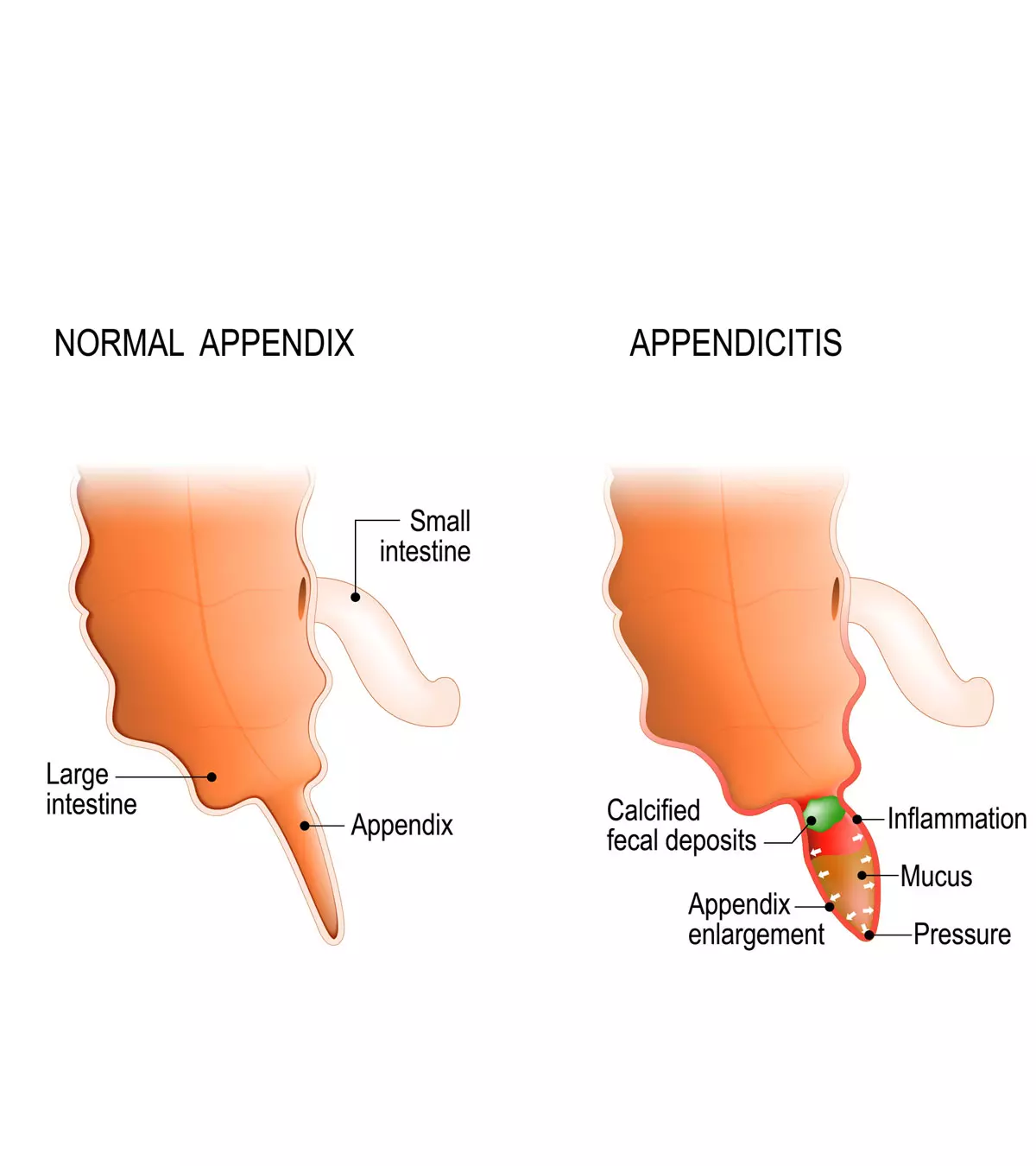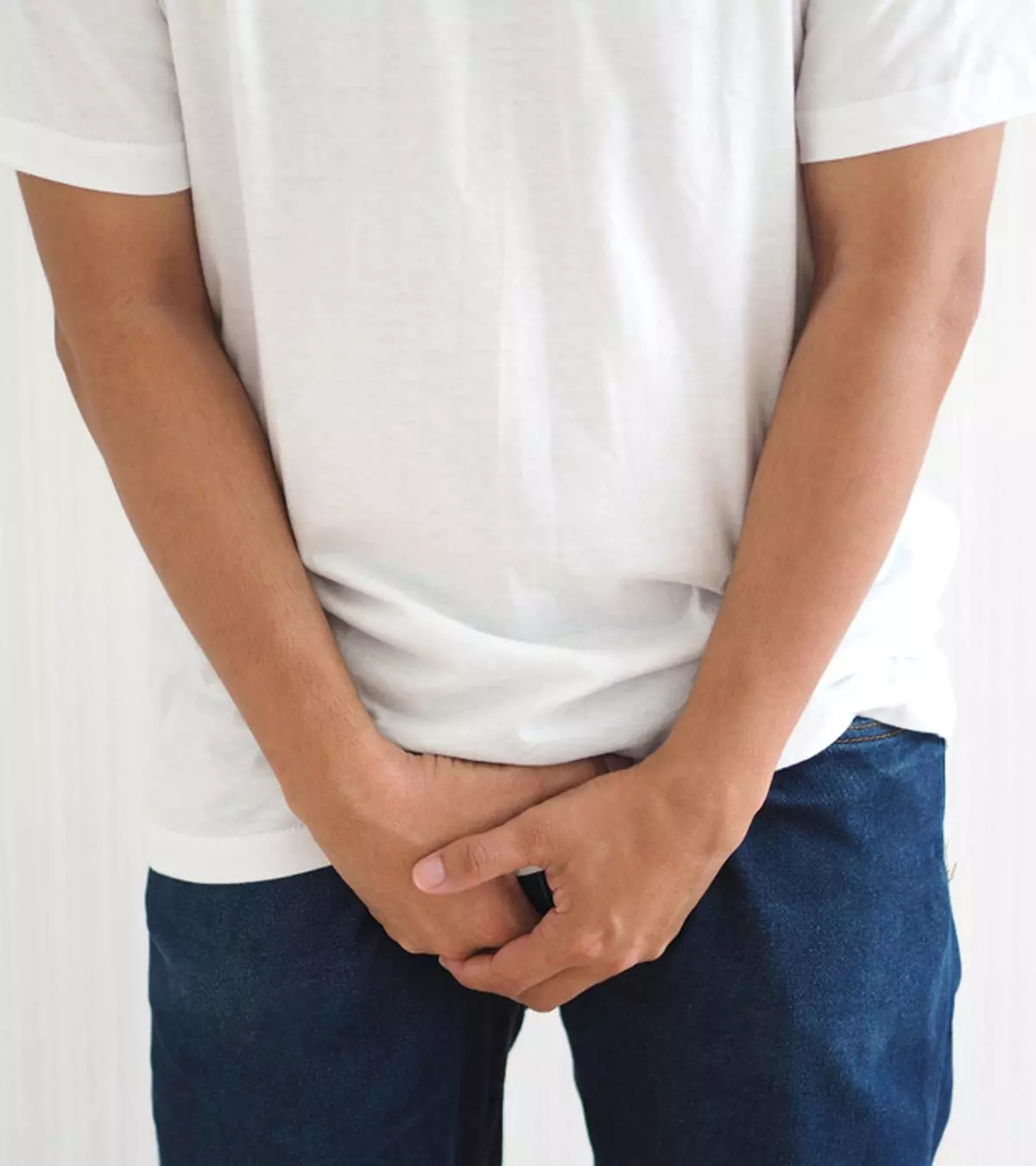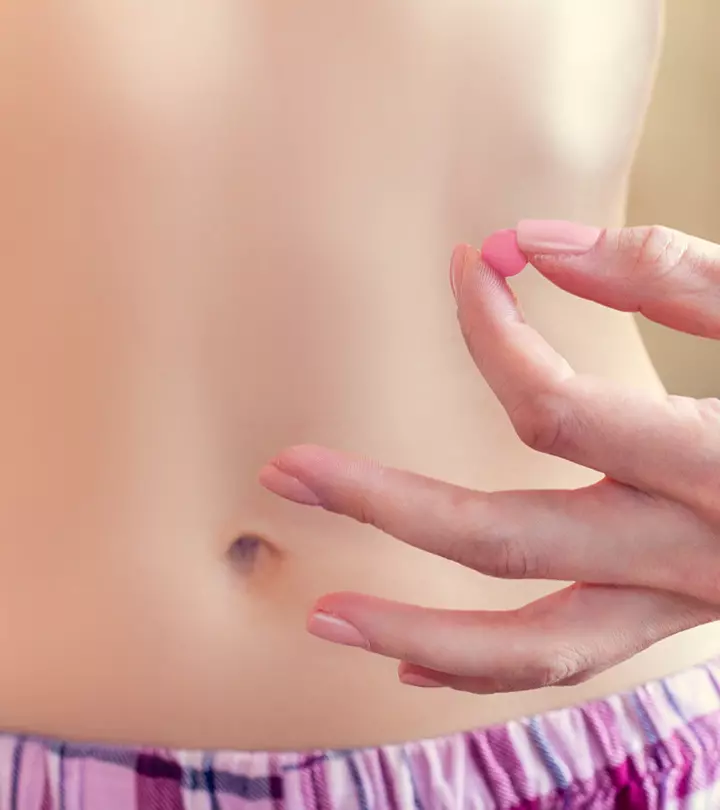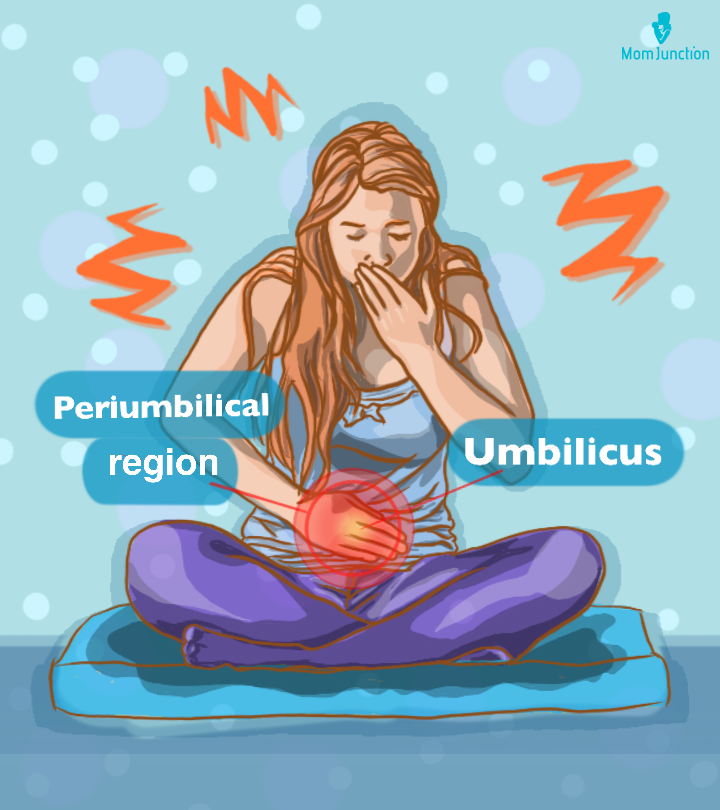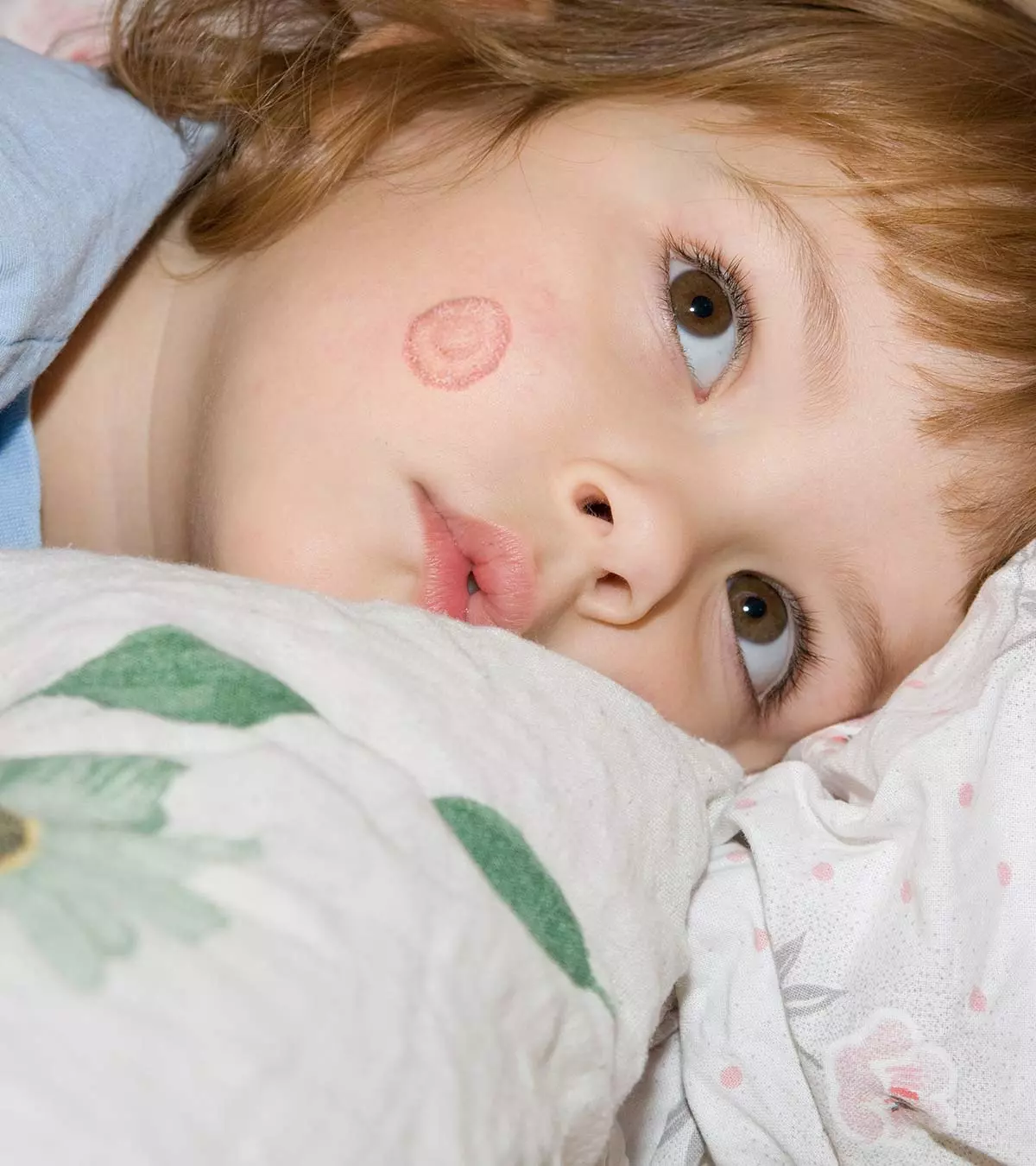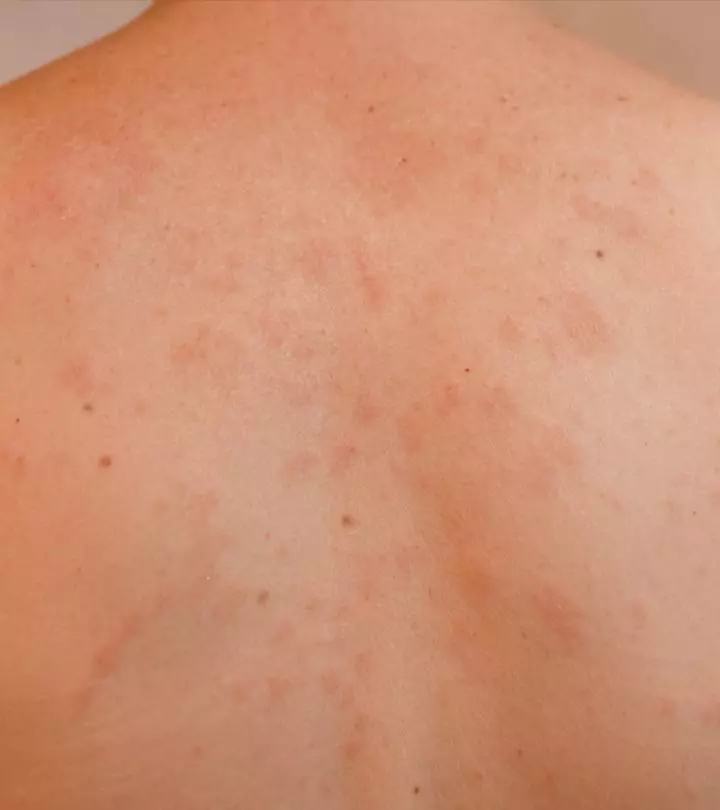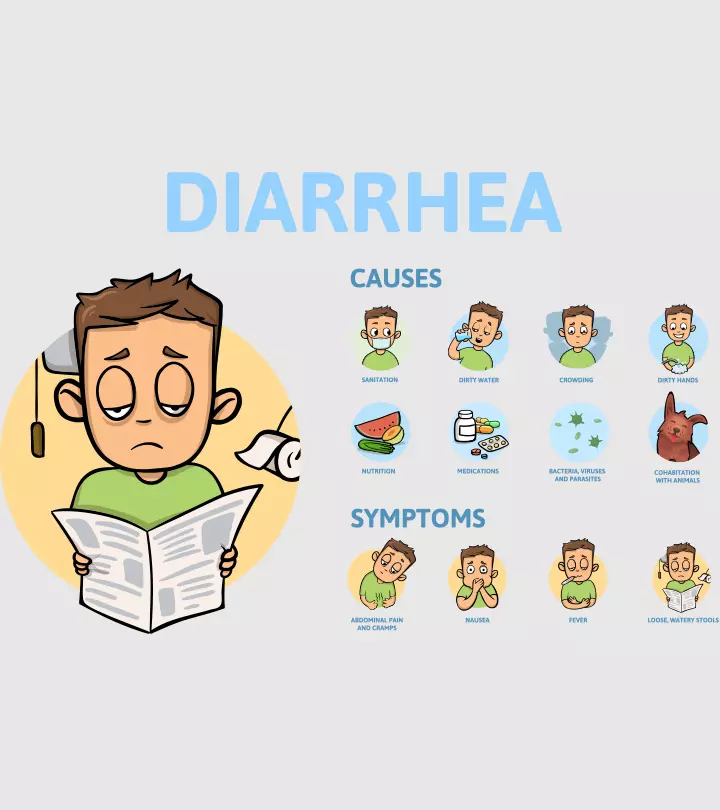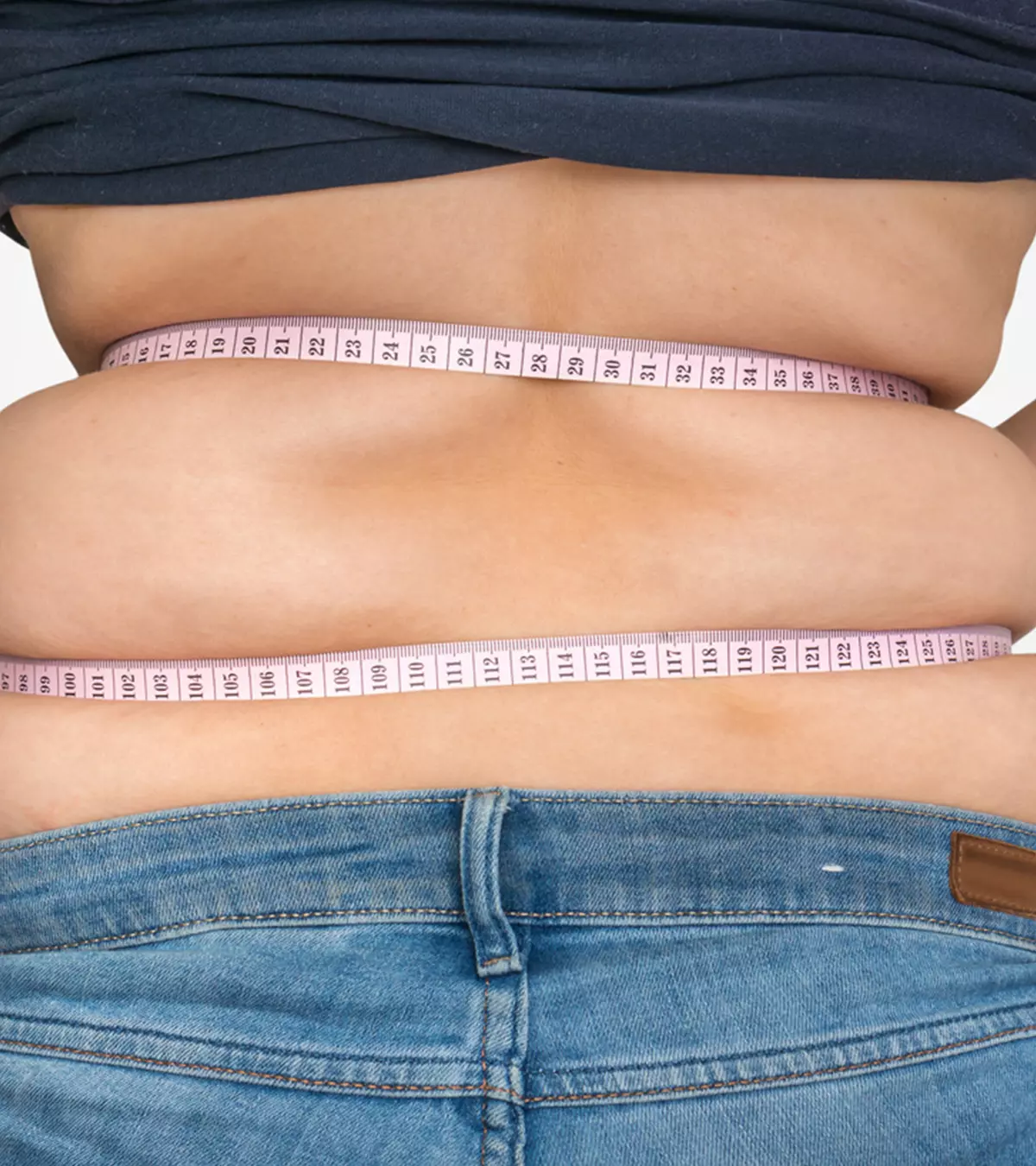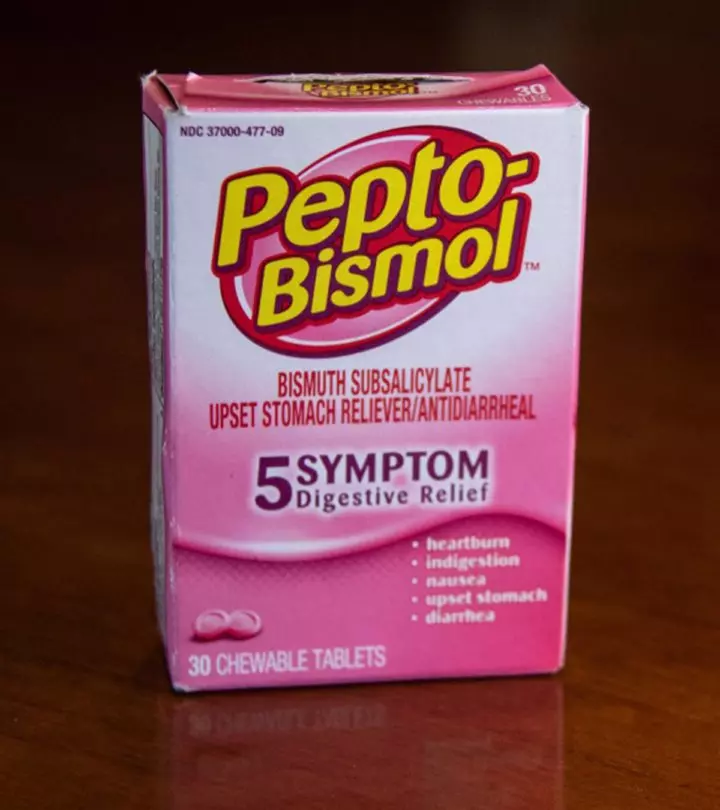
Image: Shutterstock
It is not uncommon to have children complain of frequent stomach aches, especially if they eat out often. Parents may consider over-the-counter medications, such as Pepto-Bismol for kids, in such cases. Pepto-Bismol (Bismuth Subsalicylate) is considered a safe and effective medication for gastrointestinal troubles such as acid reflux, diarrhea, and indigestion. But can kids take Pepto-Bismol? What should be the dosage of Pepto-Bismol for children? Read on to find out the mechanism of action, the recommended dosage, safety, side effects, and alternatives for Pepto-Bismol in children.
Key Pointers
- Pepto-Bismol is used to treat digestive problems, and it is recommended for children above 12 years of age.
- Pepto-Bismol is available as chewable tablets and caplets
- Ensure the dosage recommendations are not exceeding the recommended limits.
- Pepto-Bismol is recommended for two days, and you may seek medical care if symptoms persist.
At What Age Can A Child Take Pepto-Bismol?
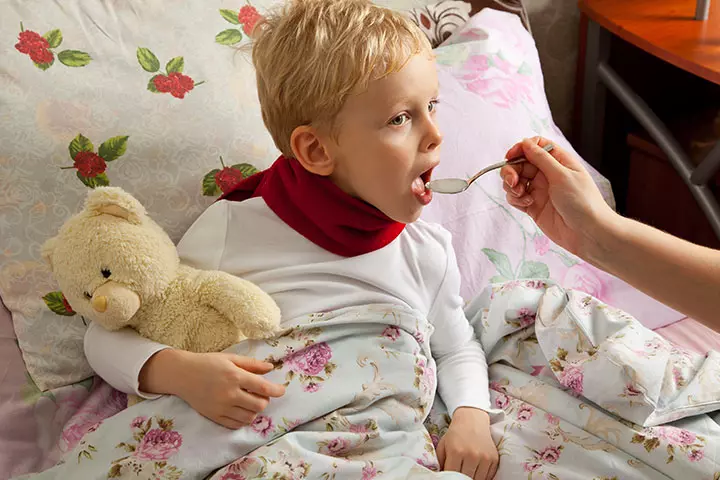
Pepto-Bismol is used to treat several digestive problems such as diarrhea, indigestion, nausea, gas, burping, an upset stomach, heartburn, and the feeling of fullness. However, only children aged 12 years and above can take Pepto-Bismol. Do not administer it to younger children without a doctor’s consultation (1).
Bismuth subsalicylate, the active ingredient in Pepto-Bismol, is a derivative of Aspirin (Acetylsalicylic Acid or ASA), which can have harmful effects on young children. Hence, for children aged between 2–11 years, an alternative medication called Pepto Kids can be given instead (2). It is a formulation made specifically for younger children. The main ingredient of this medication is calcium carbonateiA calcium-containing mineral used as an ingredient in drugs , which is considered safe for children (2).
 Quick fact
Quick factHow Does Pepto-Bismol Work?
The key ingredient of Pepto-Bismol is bismuth subsalicylate. The effectiveness of this medication comes from this active ingredient, which provides multiple benefits to the gastrointestinal system. Bismuth subsalicylate helps (3):
- Inhibit the production of prostaglandin, a group of compounds that cause inflammation and increase the movement of the gastrointestinal tract.
- Reduce the loss of fluids by increasing the reabsorption of fluids, sodium, and chloride.
- Block secretions from the intestine.
- Preventing H. pylori from binding to stomach lining cells, aiding in treating infections.
- Inhibiting bacterial enzyme activity, limiting bacterial survival in the stomach. A study published by the American Academy of Pediatrics states, “ Bismuth subsalicylate was associated with clearance of pathogenic Escherichia coli from the stools in 100% of cases (4).”
- Promote healing of stomach ulcers.
What Is Pepto Bismol Dosage For Children?
For children aged 12 years or older and adults, the following dosage of Pepto-Bismol can be given. The doctor’s recommendations or the label instructions should be strictly followed while taking the medication (1) (2) (5) (6) (7).
Pepto-Bismol liquid
- Pepto-Bismol regular strength suspension: Take 30ml (two tablespoons or the dose cup provided) every 30 minutes to one hour as per, with a maximum of eight doses (240ml) per day (24 hours). Shake the suspension well before use.
- Pepto-Bismol Ultra suspension: For diarrhea or traveler’s diarrhea, take 15ml every 30 minutes or 30ml every hour, with a maximum of eight doses (120ml) in 24 hours. Problems due to overindulgence in food/drink can be relieved by taking 15ml every half an hour.
Pepto-Bismol chewable tablets or caplets
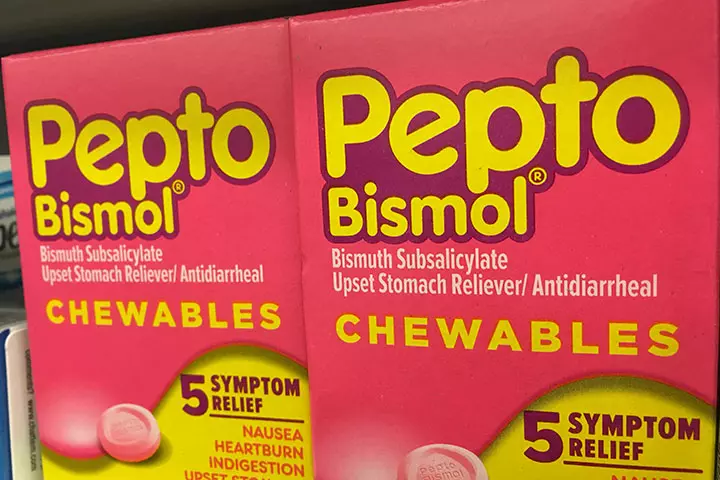
- Take two chewable tablets or regular-strength caplets every 30 minutes to one hour, depending on the requirement.
- Do not take more than eight doses (16 tablets) of regular-strength caplets in 24 hours.
- While chewable tablets should be chewed or dissolved in the mouth, regular-strength caplets must be swallowed with water.
- In the case of Pepto-Bismol Ultra caplets for diarrhea, take one caplet every 30 minutes or two caplets every hour. For problems related to overeating or indigestion, take one caplet every 30 minutes. Kids’ pepto dosage should be restricted to eight caplets per 24 hours.
Additional instructions
- Do not take the medication for more than two days. Consult a doctor if diarrhea persists beyond two days.
- Pepto-Bismol could cause dehydration in children suffering from diarrhea. Hence, ensure your child drinks clear fluids frequently.
Pepto Kids
Pepto Kids is the child-safe version of Pepto-Bismol. It is suitable and provides relief to children aged 2-11 years. The following is the dosage for Pepto-Kids.
- Children weighing 24–47lb and aged between 2–5 years should have one tablet as needed. The maximum dosage is three tablets per day (24 hours).
- Children weighing 48–95lb and aged 6–11 years should have two tablets as needed. The maximum dosage is six tablets in 24 hours.
Why Should Younger Children Not Take Pepto-Bismol?
If Pepto-Bismol is taken by children younger than 12 years, it can cause harmful complications.
- Reye’s Syndrome
The active ingredient of the medicine is bismuth subsalicylate. It shows limited effectiveness in children and poses a high risk for Reye’s syndrome (1). Reye’s syndrome is characterized by acute elevation of pressure in the brain and liver damage due to fat accumulation.
It can cause symptoms such as convulsionsiUncontrolled and violent shaking in the body due to rapid contraction and relaxation of the muscles , deliriumiA sudden and intense disturbance in a person’s mental status, resulting in confusion and unawareness , fainting, vomiting, crankiness, lethargy, and confusion and is often preceded by a viral infection, such as flu, chickenpox, or influenza (8) (9).
- Other side effects

Here are a few other side effects of Pepto-Bismol (9).
- Darkening of stools and tongue may occur due to the reaction of its ingredient bismuth with sulfur in your saliva and digestive system. The reaction may form black-colored bismuth sulfide. It is generally harmless. However, if the effect lasts for more than three days, consult a medical professional.
- Overdose can result in deafness, ringing of ears, exhaustion or dizziness, and confusion.
When Should Older Children Stop Taking Pepto Bismol?
Pepto-Bismol should be avoided in the following cases, even for older children (1).
- Children and teens who recently had chickenpox or flu-like symptoms and are recovering from them

- Children who are allergic to salicylates and aspirin
- Children who are currently on any other salicylate medication/products
- Children who have an ulcer, preexisting black or bloody stools, or a bleeding issue
Children and adults taking medication for the following medical conditions should consult a doctor before taking Pepto-Bismol (1).
- Diabetes
- GoutiA complex form of arthritis causing pain and inflammation in the joints
- Arthritis
- Thinning of blood (anticoagulation)
Pepto-Bismol may have interactions with other drugs. So, if your child is on any medications, it is best to talk to a doctor before giving them Pepto-Bismol (1).
You should also consult a doctor before giving your child Pepto-Bismol if they have any health concerns such as fever or mucus in the stool (1).
 Point to consider
Point to considerFrequently Asked Questions
1. Which is better, Tums or Pepto-Bismol?
Tums and Pepto-Bismol are effective antacids for children and have different compositions and mechanisms. While Tums works faster, Pepto-Bismol treats infections. Pepto-Bismol contains bismuth subsalicylate, the anti-inflammatory properties of which work on the stomach lining to treat infections. In comparison, Tums contain calcium carbonate, which neutralizes stomach acid. Hence, the suitability of either medication depends on the purpose.
2. Can Pepto-Bismol treat stomach bugs?
The over-the-counter medication Pepto-Bismol can treat viral gastroenteritis or stomach bug. However, it is recommended to consult a doctor before taking any medications for a stomach ache (10).
3. Can I give my child Pepto and Tylenol at the same time?
In general, it is safe for adults to take Pepto-Bismol with Tylenol (paracetamol) after the doctor’s suggestion (11). However, it is unknown if the combination is safe for children. Hence, seek the advice of a doctor before administering them.
4. Does Pepto help with food poisoning?
According to Dr. Christina Johns, pediatric emergency physician from Annapolis, Maryland, “The active ingredient in Pepto Bismol (bismuth subsalicylate) can decrease discomfort associated with gastrointestinal symptoms such as nausea, diarrhea, stomach ulcers, and heartburn. Therefore, it can help manage some effects and symptoms of food poisoning once they occur. It cannot, however, prevent or cure food poisoning. In addition, due to the potential for salicylate toxicity, Pepto Bismol should not be given to young children.”
5. Does Pepto work on an empty stomach?
Dr. Johns says, “Pepto can be effective on an empty stomach. Rather than interacting with the food itself, it forms antimicrobial compounds, increases fluid reabsorption, and decreases intestinal secretions in the stomach.”
Pepto Bismol for kids has aspirin derivatives, which can have harmful effects on younger kids, so it is not to be used on children below 12 years of age without a doctor’s consultation. It is available as chewable tablets and caplets, and the dosage recommendations should be strictly followed. Pepto Bismol has a few side effects and should be avoided by kids who recently recovered from chickenpox or flu, have allergies to aspirin, ulcers, and any pre-existing long-term illnesses. Usage is usually recommended for two days, and you may seek medical care if symptoms persist.
Infographic: Quick Overview Of Pepto-Bismol For Children
Pepto-Bismol is a go-to OTC medication for many parents when their child complains of stomach problems. Check out the following infographic to quickly understand:
- What Pepto-Bismol can treat
- Its side effects
- Who should not use it

Illustration: Momjunction Design Team
Illustration: Pepto Bismol For Kids: Safety Uses Dosage And Side Effects

Image: Dall·E/MomJunction Design Team
Learn how to effectively use Pepto Bismol to relieve stomach discomfort and digestive problems. Follow these clear instructions for quick relief and better overall health.
References
- PEPTO-BISMOL- bismuth subsalicylate.
https://dailymed.nlm.nih.gov/dailymed/drugInfo.cfm?setid=33baaf04-498d-44f2-9288-02b8f874f914 - PEPTO KIDS- calcium carbonate tablet chewable.
https://dailymed.nlm.nih.gov/dailymed/drugInfo.cfm?setid=673c45dc-84fd-5b45-e053-2a91aa0adea8 - Bismuth Subsalicylate.
https://www.ncbi.nlm.nih.gov/books/NBK560697/ - Humberto Soriano-Brücher et.al; (1991); Bismuth Subsalicylate in the Treatment of Acute Diarrhea in Children: A Clinical Study.
https://publications.aap.org/pediatrics/article-abstract/87/1/18/56744/Bismuth-Subsalicylate-in-the-Treatment-of-Acute?redirectedFrom=fulltext - PEPTO-BISMOL ULTRA- bismuth subsalicylate suspension.
https://dailymed.nlm.nih.gov/dailymed/drugInfo.cfm?setid=673893bd-f8e9-23b0-e053-2a91aa0aa1d4 - PEPTO BISMOL- bismuth subsalicylate tablet.
https://dailymed.nlm.nih.gov/dailymed/fda/fdaDrugXsl.cfm?setid=aa7039b0-5e5c-439c-99aa-a7ac217ffeaf&type=display - PEPTO-BISMOL ULTRA- bismuth subsalicylate tablet.
https://dailymed.nlm.nih.gov/dailymed/lookup.cfm?setid=63274378-fbe1-63b1-e053-2a91aa0ae1a7 - Reye’s Syndrome.
https://www.ninds.nih.gov/health-information/disorders/reyes-syndrome - Reye Syndrome.
https://www.healthychildren.org/English/health-issues/conditions/abdominal/Pages/Reye-Syndrome.aspx - Pepto-Bismol (bismuth subsalicylate).
https://www.nhs.uk/medicines/pepto-bismol/ - Treatment of Viral Gastroenteritis (“Stomach Flu”).
https://www.niddk.nih.gov/health-information/digestive-diseases/viral-gastroenteritis/treatment
Community Experiences
Join the conversation and become a part of our nurturing community! Share your stories, experiences, and insights to connect with fellow parents.
Read full bio of Maria Carmela Villania-Mamauag
- Dr. Christina Johns is the vice-president of Communications at PM Pediatrics, a specialized pediatric urgent care provider. The pediatric emergency physician did her education at Johns Hopkins University School of Medicine and has over 25 years experience in the field.
 Dr. Christina Johns is the vice-president of Communications at PM Pediatrics, a specialized pediatric urgent care provider. The pediatric emergency physician did her education at Johns Hopkins University School of Medicine and has over 25 years experience in the field.
Dr. Christina Johns is the vice-president of Communications at PM Pediatrics, a specialized pediatric urgent care provider. The pediatric emergency physician did her education at Johns Hopkins University School of Medicine and has over 25 years experience in the field.
Read full bio of Shivali Karande
Read full bio of Dr. Ritika Shah
Read full bio of Dr. Joyani Das







